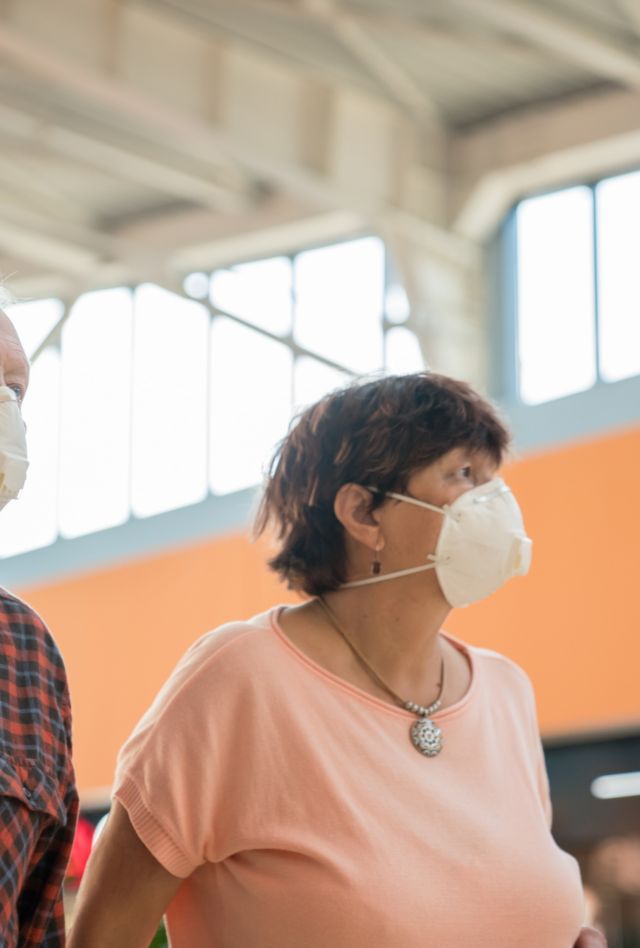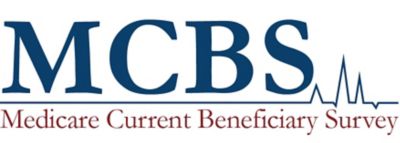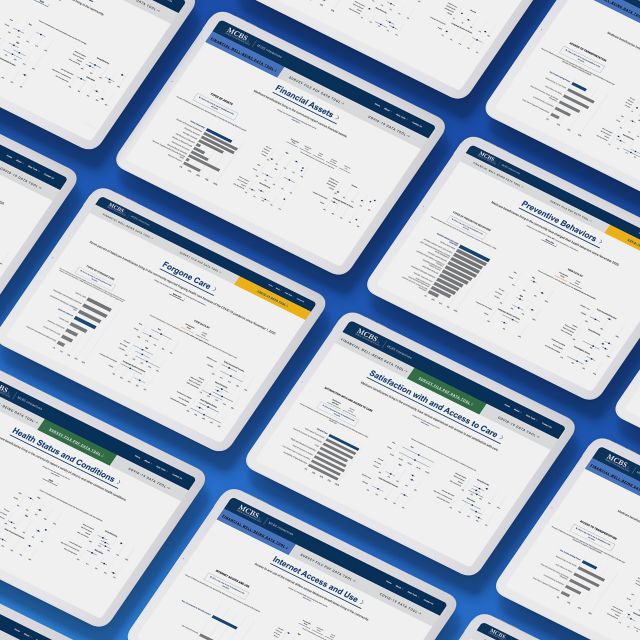Medicare Current Beneficiary Survey (MCBS) COVID-19 Supplements

Problem
COVID-19 thoroughly disrupted the delivery of Medicare health care services.
With the emergence of the COVID-19 pandemic in the U.S., the Centers for Medicare & Medicaid Services (CMS) was uniquely positioned to quickly collect vital information on how the pandemic has impacted the Medicare population by using the MCBS as a vehicle to collect data. The Medicare Current Beneficiary Survey (MCBS) is an ongoing survey of a representative national sample of the Medicare population, including beneficiaries aged 65 and over and those below 65 with certain disabling conditions. Medicare beneficiaries, by definition, are most at risk for underlying conditions that may lead to more severe COVID-19 illness or complications.
Solution
NORC supported CMS by quickly launching a series of surveys on the pandemic’s impact on Medicare beneficiaries.
NORC conducted a series of rapid response telephone surveys with MCBS respondents for the Office of Enterprise Data and Analytics (OEDA) at CMS. This data collection supplemented the annual data collection for the MCBS and helped CMS better understand how COVID-19 affects Medicare beneficiaries and potential program changes needed in response to the pandemic. The questionnaire content explored topics such as the availability of telemedicine visits, deferred medical care, social distancing and other preventive health behaviors, COVID-19 testing and vaccination, and the consequences for social, emotional, and financial well-being. In 2020, the supplemental surveys began to collect data for beneficiaries in long-term care facilities, and since 2021, many of these questions have been added to the ongoing MCBS.
COVID-19 Summer 2020 Community Supplement: NORC conducted the first standalone MCBS COVID-19 Rapid Response Supplement in June-July 2020 for beneficiaries living in the community who already participated in the MCBS. Data were combined with demographic and health status data collected during prior interviews and released in a standalone Public Use File (PUF) in October 2020. Data were also released in the 2019 MCBS Survey File Limited Data Set (LDS).
COVID-19 Fall 2020 Community Supplement: After a successful Summer 2020 Community Supplement, NORC conducted the second standalone MCBS COVID-19 Rapid Response Supplement for beneficiaries living in the community in October-November 2020. Data were released in another standalone PUF in January 2021 and in the 2019 MCBS Survey File LDS.
COVID-19 Winter 2021 Community Supplement: NORC conducted the third standalone MCBS COVID-19 Rapid Response Supplement for beneficiaries living in the community in March-April 2021. Data were released in a final standalone PUF in July 2021 and in the 2020 MCBS Survey File LDS. After Winter 2021, a subset of the COVID-19 Community Supplement items was integrated into the main MCBS questionnaire instrument.
COVID-19 Fall 2020 Facility Supplement: A COVID-19 Facility Supplement was also added to MCBS data collection beginning in October 2020. NORC administered these COVID-19 questions within the main MCBS Facility Instrument from October-December 2020. Data were released in the 2020 MCBS Survey File LDS
COVID-19 Winter 2021 Facility Supplement: NORC administered this COVID-19 Facility Supplement from January-April 2021 and data will be released in the 2021 MCBS Survey File LDS. Items from the COVID-19 Facility Supplement will continue to be fielded within the main MCBS Facility Instrument.
Result
The MCBS provided key insight into how COVID-19 affected the Medicare population.
Findings using data from the MCBS COVID-19 Supplements have been published in a variety of sources, including peer-reviewed journals such as Annals of Internal Medicine, JAMA Health Forum, the Journal of General Internal Medicine, the Journal of the American Geriatrics Society, JAMA Internal Medicine, the Journal of Medical Internet Research, and Frontiers in Public Health. Publications have covered topics including access to care, mental health, vaccine uptake, and access to and use of telemedicine.
NORC supported CMS in releasing a series of COVID-19 Data Snapshot Infographics, which explored the impact of the COVID-19 pandemic on Medicare beneficiaries using data from the three COVID-19 Community Supplements, as well as an advanced tutorial with guidance on using LDS and PUF data from the COVID-19 Supplements. For example, the COVID-19 Fall 2020 Data Snapshot Infographic shows that Medicare beneficiaries reported forgoing various types of health care because of the pandemic. The most commonly reported type of forgone care was a regular check-up, and the most common reason a beneficiary decided to forgo care was not wanting to risk being at a medical facility during the pandemic.
In addition, to support dissemination of estimates from the MCBS COVID-19 Community Supplements, NORC created the MCBS COVID-19 Data Tool, available at NORC’s MCBS Interactives website. The tool consists of interactive dashboards showing how COVID-19 has affected the lives of Medicare beneficiaries, including preventive behaviors, forgone care, well-being, sources of COVID-19 information, and COVID-19 vaccination. The tool also allows visitors to visualize the data using a variety of demographic and health status filters, such as sex, age, smoking status, and chronic conditions. The tool presents data from the COVID-19 Summer 2020 PUF, COVID-19 Fall 2020 PUF, and COVID-19 Winter 2021 PUF. For example, the MCBS COVID-19 Data Tool shows that in Winter 2021, approximately 64 percent of Medicare beneficiaries living in the community reported that their usual health care provider was offering telemedicine appointments during the COVID-19 pandemic.

Are you a respondent?
Questions about the survey? Experiencing technical difficulties? Contact us:
Learn More About the Study
Related Tags
Project Leads
-
Michelle Strollo
Senior Vice PresidentSenior Staff -
Edward Mulrow
Senior Vice President & DirectorSenior Staff -
Micah Sjoblom
Vice PresidentSenior Staff











